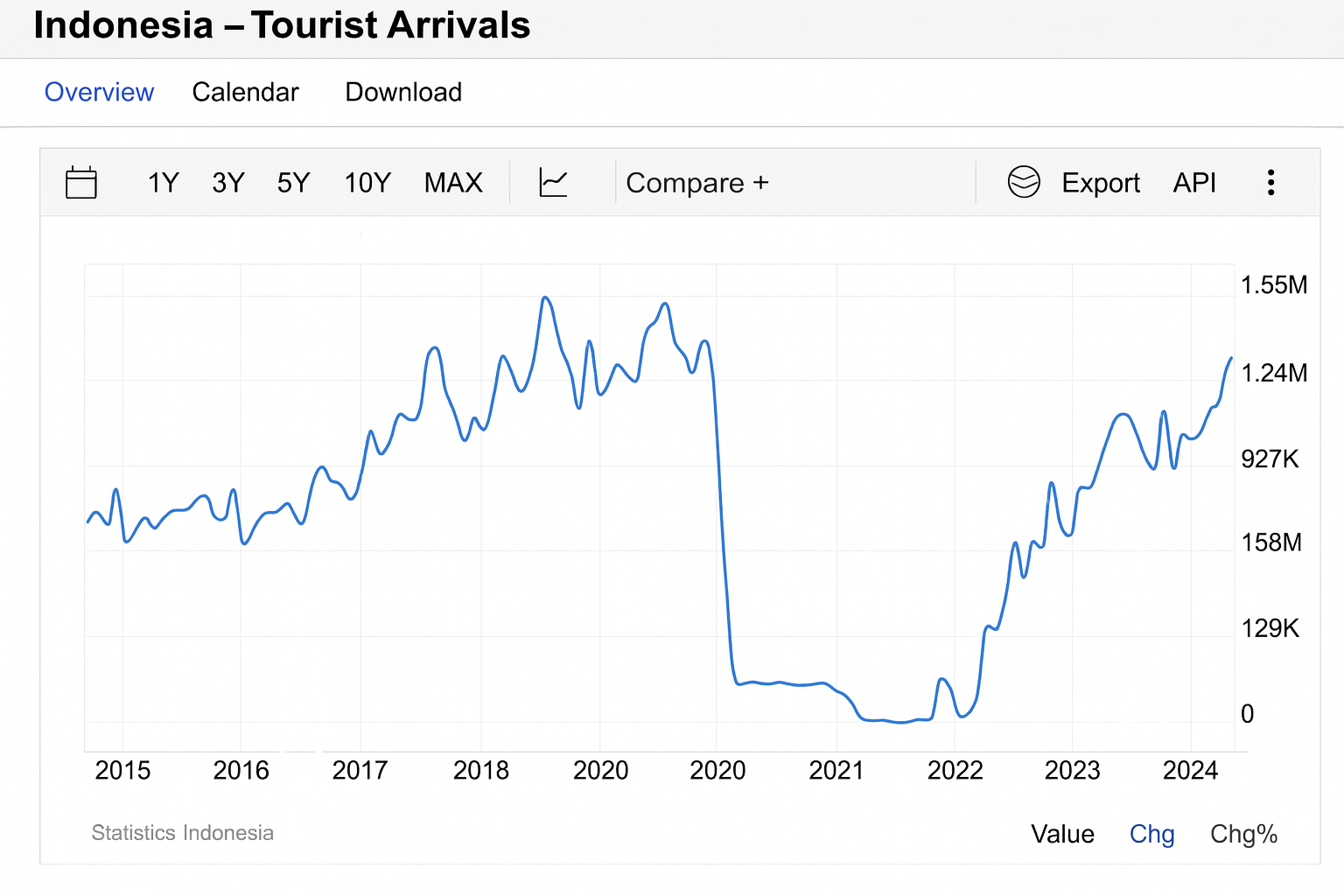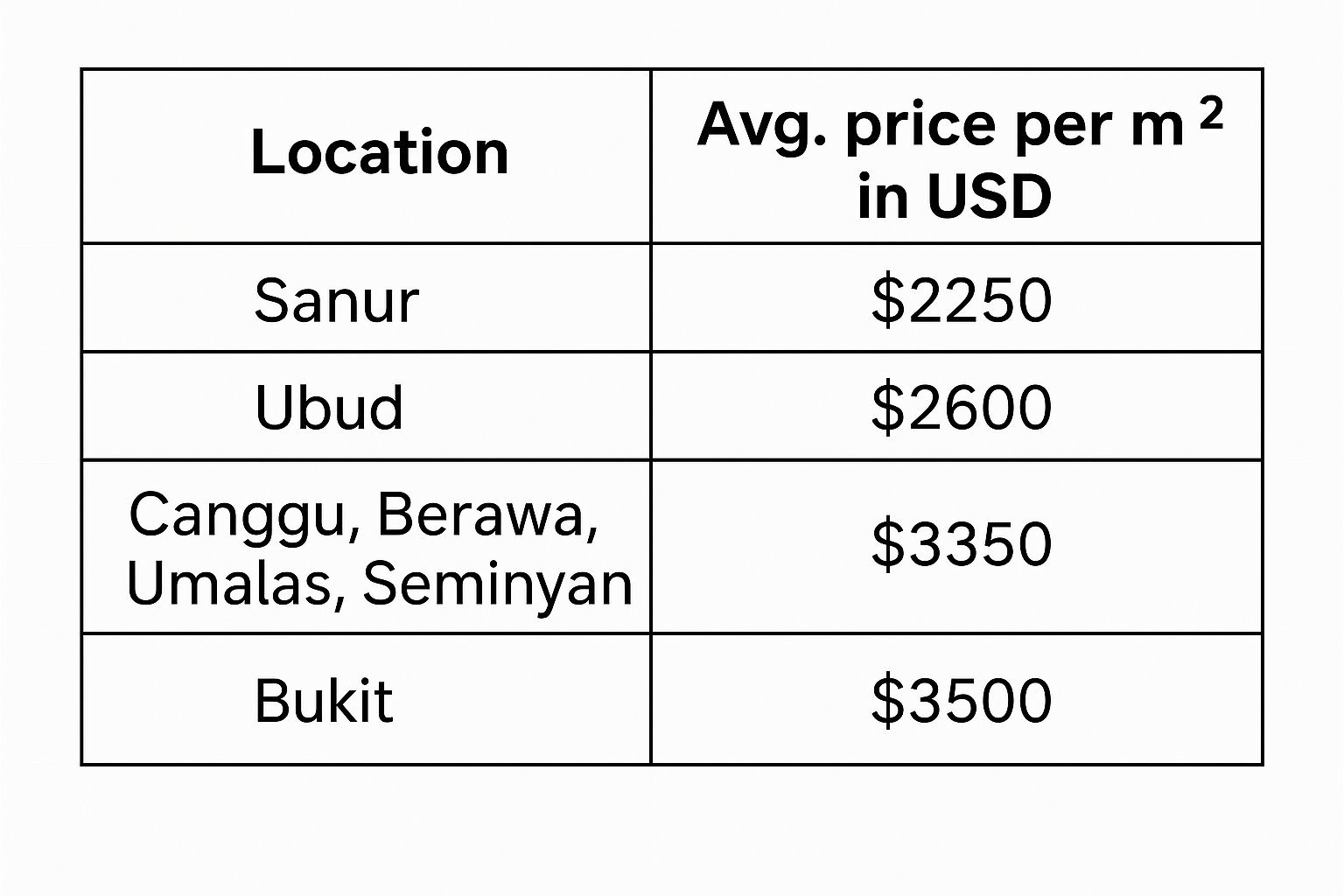

The picturesque Indonesian island of Bali is undergoing rapid development year after year. Due to the growing number of tourists, expats, and migrants arriving on the island, Bali has become an increasingly attractive hub for real estate investment. In this article, we’ll take a closer look at the current state of the real estate market in Bali and explore the opportunities it holds for investors.
The demand for real estate in Bali is gaining momentum. One of the key reasons for this is the growing number of tourists arriving each year. According to Trading Economics, since the end of the pandemic in 2022, the number of tourist arrivals has grown steadily. In 2024, it reached one of the highest levels ever recorded.
 This upward trend is expected to continue, which means the demand for real estate will also grow. Tourists seek comfortable and memorable accommodations, and many foreigners choose Bali for long-term stays, remote work, or even to start a business in Bali. The Indonesian government has developed a 10-year roadmap for Bali’s development, and several major points have already been implemented. Since 2022, the Bali International Hospital has opened, new roads have been built, and Sanur Port has been reconstructed. For 2025, the launch of a large Paramount theme park is scheduled, and further infrastructure developments are planned, including an elevated metro system and a new airport in the north of the island.
This upward trend is expected to continue, which means the demand for real estate will also grow. Tourists seek comfortable and memorable accommodations, and many foreigners choose Bali for long-term stays, remote work, or even to start a business in Bali. The Indonesian government has developed a 10-year roadmap for Bali’s development, and several major points have already been implemented. Since 2022, the Bali International Hospital has opened, new roads have been built, and Sanur Port has been reconstructed. For 2025, the launch of a large Paramount theme park is scheduled, and further infrastructure developments are planned, including an elevated metro system and a new airport in the north of the island.
These changes are attracting not only more tourists but also more expats and long-term migrants. As a result, there is strong demand for rental properties across resort areas — hotels, houses, and villas — and for relocators, apartments, condos, and commercial spaces.
In 2023, the Bank of Indonesia analyzed the residential property market. Their report showed continued growth in housing prices. Compared to previous years, the pace of the Residential Property Price Index (RPPI) accelerated, reaching 1.92%, up from 1.79% the year before.
Property prices vary depending on the area and several other factors. Popular tourist hotspots like Seminyak, Canggu, and Ubud tend to be more expensive than less developed regions. Below are average prices for fully furnished villas.
 Rental yields also depend on multiple aspects:
Rental yields also depend on multiple aspects:
1. Property type
2. Location
3. Season
4. Market competition
5. Overall market trends
For example, the average annual rental returns from a villa can range from 8% to 15%. For apartments or condos, returns typically range from 6% to 10%. If you purchase a property during the construction phase and resell it upon completion, the price may increase by 30%–50%.
If you choose Bali as your investment destination, it’s important to understand the legal and cultural landscape.
In Indonesia, full property ownership (Hak Milik) is only available to Indonesian citizens. For foreign investors, there are certain restrictions. However, the law offers legal structures that allow long-term control and use of property.
Unofficial schemes may exist in which a property is registered under an Indonesian individual’s name while a foreigner signs a power of attorney or private agreement. However, these arrangements are not legally recognized and provide no legal protection. In disputes, only the Indonesian party will be recognized as the legal owner. Therefore, such methods are not recommended for long-term investments.
Foreign investors who wish to purchase property in Indonesia legally should consider the following forms of ownership:
✓ Hak Pakai (Right to Use) — available to individuals. This grants the right to use the property for up to 30 years, with an option to extend.
✓ Hak Guna Bangunan (HGB) — the right to build, which can be obtained through registering a foreign-owned company (PT PMA). This option is suitable for those looking to rent out, operate a business, or develop a tourism facility.
✓ Hak Sewa (Leasehold) — long-term lease of land or buildings for up to 45 years, renewable.
The right structure depends on your goals — whether you want to live in the property, rent it out, run a business, or sell it later. It’s crucial to legally register all documents and choose the appropriate scheme. A licensed lawyer or reliable consulting company can help you avoid costly mistakes and ensure full control over the property.
To summarize, the real estate market in Bali continues to grow thanks to steady demand from international buyers and tourists. While there are specific legal nuances for foreign investors, the high returns make Bali a highly attractive option for long-term investment.
To avoid legal issues and minimize risks, always work with reputable agents. Since 2020, our company Good Luck Group has successfully helped foreigners register companies and open bank accounts in Bali. Whether you’re looking to purchase real estate or start a business in Bali, we can ensure the process is safe and hassle-free. Contact us if you have questions — we’ll be happy to assist!


